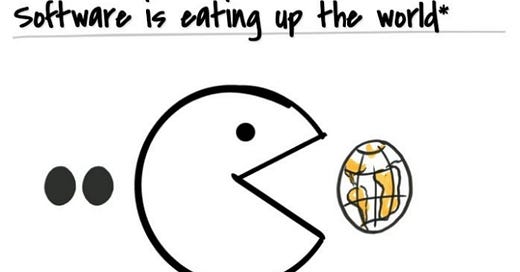In an article about the USA v. China military balance, Jon Stokes notes that software is eating the world:
software is eating the world. […] in every part of the world software has eaten, every fight now reduces to a fight over who has root.
Voting, news, conversation, content, entertainment. Every fight converges on "got root?"
This is true. It’s true on the latest spat between Apple and Facebook over how much privacy iPhone users should have, and it’s also true in the military environment.
Computers run software. Control that software, or better still control the hardware the computer runs on, and you control the computer system; you have a good deal of actual control over the humans using it. And much of the computing and communications systems used by British people are controlled by foreign corporations and states. In a war, if one side can gain control (even partial control) over the other side’s computing, that side will win.
And in the world of entertainment and social media, if you control social media, you control what the people using it can think: ideas that you don’t want them to think don’t even get presented to them, and often they might not even be aware that the forbidden ideas exist.
It follows from all this that any country that wants to be truly independent has to control its computing and communications infrastructure. This includes all layers of the technology stack:
Integrated circuits for example CPUs, graphics and AI co-processors.
Assemblies of circuits such as circuit boards, computers, mobile phones, USB solid-state hard disks.
Operating Systems including versions for servers, desktop/laptop computers, tablets and phones. Ideally there should be an open source OS that has various front ends for servers, desktops/laptops, and tablets/phones.
Network infrastructure, including colocation, internet hosting services, cloud services like AWS or Azure.
Social Media, e.g. Facebook, Twitter, YouTube, TikTok.
Internet-based services and APIs such as Google search, Gmail, Google Maps (and, importantly, its API).
Implications for Geopolitics
In the list above, the most limiting item is integrated circuits. A chip fab can cost up to $20 billion. This means a polity that can’t or won’t fork out $20 billion can say goodbye to independence; this limits the number of truly independent polities in the world.
The other items can be duplicated much more cheaply. For example, is a state wanted to develop its own operating system, it would very likely base it on open source unixlike operating systems using the Linux kernel, as this would be the obvious path to take. Building and maintaining a customised version of Linux would cost a lot less than $20 billion.
Implications for Warfare
As an example, consider the UK’s Type 45 destroyers cost £1 billion each. They run an old version of Microsoft Windows dubbed “Windows for Warships”. No doubt the NSA has backdoors into Windows and has done for a long time.
I don’t know where the chips in the computers were made, specifically how many were made by China-owned or Chinese-controlled entities. I don’t know whether the Ministry of Defence knows either.
If the UK is involved in a big conflict with a major power such as USA or China, it needs to make sure that an adversary cannot take control of its military hardware. If it doesn’t do this, the results will be disastrous.
(Note that while is it very unlikely the UK would be fighting a war against the USA, it is more likely the UK would be fighting a war the USA doesn’t want it to, as happened in the Suez crisis in 1956. In a similar event, it would be rather embarrassing for the UK to find its expensive military hardware didn’t work.)
The same arguments apply to the armed forces of all mid-tier countries.
Implications for Europe, UK and Scotland
The EU is belatedly and slowly coming to the realisation that controlling its computing infrastructure is important. They will probably get there eventually.
The UK isn’t, as far as I’m aware. Is the issue even on Boris Johnson’s radar? I expect he regards his flat redecoration as more important.
While the EU is certainly big enough to control its full technology stack, the UK would find it more difficult to do so. In geopolitics size matters, and this is true in technology as it is in everything else. The UK would have been better off not leaving the EU, but reforming it from within. The EU, like all human institutions, is imperfect, but it is simply the only game in town as a vehicle for the UK to have power in the world.
Scotland is currently part of the UK, but many Scots want to leave the UK and rejoin the EU (which they were forced out of, against their will). A Scotland in the EU would have more ability to build total control over its computing technology stack than a Scotland that stays in the UK would. This is because:
The EU is bigger than the UK and therefore better able to build its own computing technology stack than the UK is.
The EU seems to care more about the issue than the UK does.
In consequence, Scotland would be better able to gain computing and communications independence if it left the UK and rejoined the EU.




